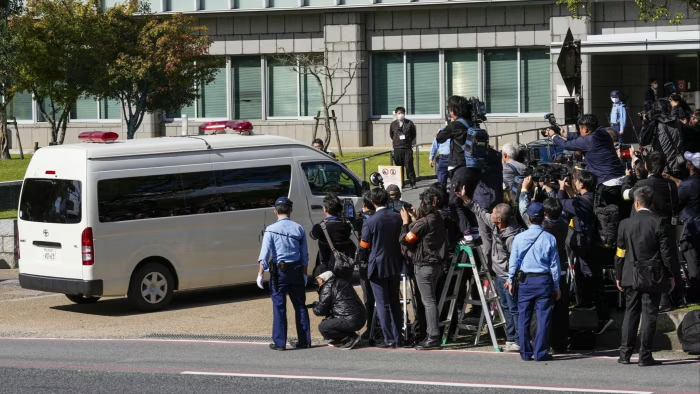Stay informed with free updates
Simply sign up to the Life & Arts myFT Digest — delivered directly to your inbox.
The cold killers of fiction have an endlessly sinister appeal. Rueful assassins, rogue assassins, the wisecracking, the laconic, the licensed to kill. The variety of screen, game and literary killers attests to a fascination that would feel absolutely wrong if it were not laced with a seductive permission to indulge.
When it comes to real-world assassinations, though, we like to think we respond more appropriately, whatever our sympathies with the killer’s motivation or with the dark pragmatism of state-sanctioned violence. We are horrified when assassination is deployed with no possible legitimacy but often grimly accepting of its necessity, in the case of Osama bin Laden, say.
Japan, in the closing months of 2025, is being tested on the genuineness of its revulsion. It owes itself honesty about why that is so. More than three years after the July 2022 assassination of former prime minister Shinzo Abe, the trial of his killer has finally begun. Japan has mourned the loss of its popular and longest-serving leader, and has waited to see justice served. Possibly in the form of a death penalty.
But the debate over exactly what justice should look like for Tetsuya Yamagami, who fashioned a ramshackle gun to commit the murder, and has plainly admitted his guilt, has shifted over these past few years.
That shift is all the more jarring for being on an issue that would normally be seen in terms of moral and legal absolutes. Many thousands of law-abiding Japanese have petitioned the Nara District Court to show leniency when Yamagami is eventually sentenced: some who see the death penalty as excessive in any circumstances, others who genuinely feel that while Abe’s murder itself was a great evil, the political shake-up that followed has had some benefits.
Rather too easily, a real-life criminal is slipping into the fantasy-scape of assassin-as-hero
Websites have marshalled his supporters. Vendors on Yahoo! Auctions are offering T-shirts emblazoned with the rising sun, celebrating the date of the Abe assassination and lionising Yamagami, either with a photograph of him taken at the murder scene or, even more disturbingly, a manga rendition of him brandishing his weapon. Rather too easily, a real-life criminal is slipping into the fantasy-scape of assassin-as-hero.
On the first day of Yamagami’s trial, in late October, over 700 people queued for 32 available seats: Japanese media quoted several of the queuers saying they would risk contempt of court charges for the chance to get inside and shout their encouragement to the 45-year-old murderer.
Underpinning that support is a broader base of sympathy than was imaginable in the immediate aftermath of Abe’s death. But, as more details emerged, Yamagami’s backstory started to resonate for many who had experienced comparable miseries.
Yamagami’s mother, following the suicide of his father, had fallen under the spell of the Unification Church — the cult-like organisation once widely nicknamed the Moonies but now known as the Family Federation for World Peace and Unification — and allegedly bankrupted the family via ruinous financial donations. Their penury caused Yamagami’s older brother to take his own life, leaving the survivor bent on revenge. He could not kill the Church leader, but instead marked for death Japan’s former prime minister, who had been pictured with the then leader of the Unification Church ahead of a critical election in 2013, and whose ruling Liberal Democratic party was known to have multiple links with the organisation.
What followed was both cinematic and illuminating. In attempting to understand the killer, Japanese media threw unprecedented resources into probing the Unification Church, its financial demands of members and its political links. The cabinet of the time was torn apart with resignations, a once marginal debate on religion entered the mainstream and the LDP, even now, continues to reel.
Yamagami’s crime has arguably delivered something even more subversive: a reminder to Japan’s postwar Dr Jekyll that there is plenty of prewar Mr Hyde in the national DNA. Abe is one of seven serving or former prime ministers to be assassinated. In the 1930s Tokyo was the global centre of political murder — so much so that diplomats of the time coined the term “government by assassination”.
If any of Yamagami’s supporters see any righteousness in his act, they would be wrong. They might be forgiven, though, for seeing a pretty clear strand of tradition, albeit a dire one. One of Japan’s pre-eminent triumphs of statecraft has been the conviction that 80 years of postwar stability has allowed the nation to attain its most natural self: pacifist, industrious, cohesive and considered. Yamagami, and his surprising support, reconnects Japan with the antithesis to that. We relish the fictional assassin for their powers of calculated, instantaneous disruption; we should not do the same for the real thing.
leo.lewis@ft.com
Find out about our latest stories first — follow FT Weekend on Instagram, Bluesky and X, and sign up to receive the FT Weekend newsletter every Saturday morning


AloJapan.com